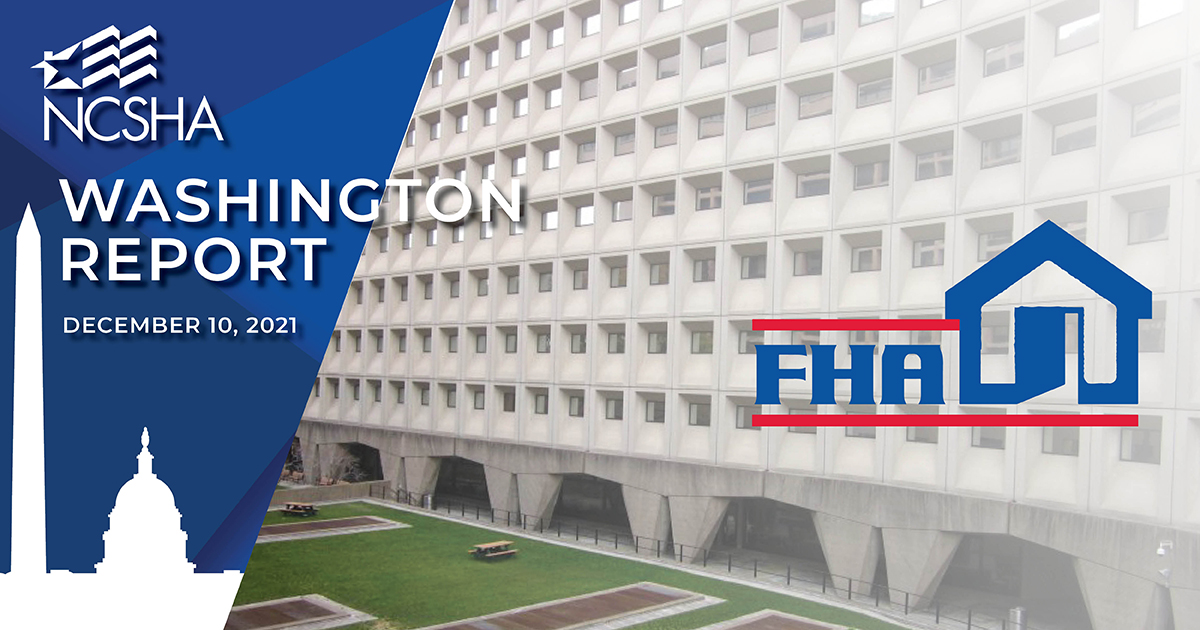NCSHA Washington Report | December 10, 2021

If you were a shareholder in the enterprise that was the largest insurer of mortgages in the world, supported almost 20 percent of home purchases in the United States today, and served double the share of Black and Hispanic families compared to the competition, you wouldn’t sleep easily knowing the business hadn’t had a permanent CEO for almost a year.
In fact, as taxpayers, we’re all shareholders in the Federal Housing Administration, one way or another. And into the twelfth month of the Biden – Harris Administration, FHA remains without a Senate-confirmed commissioner.
The president nominated Julia Gordon for the position in June. NCSHA and the major mortgage lender, servicer, realtor, investor, and consumer organizations enthusiastically endorsed the choice. Groups with no shortage of differences encouraged the Senate to confirm Gordon quickly because she “has the skills, experience, and relationships to bring people together, both within FHA and among stakeholders, to address challenges collaboratively and effectively.”
The Senate Banking Committee in August deadlocked on party lines over Gordon’s nomination, though. It’s now one of more than 100 nominations stalled in the Senate, which has precious little floor time left this year and a lot still to do, including passing the Build Back Better Act. If Gordon’s nomination slips into 2022, there’s no telling when it will come up for a final vote.
That would be playing with fire. FHA needs a Senate-confirmed commissioner to bring the executive leadership and focus on a host of mission- and market-critical issues.
While the mortgage industry’s efforts throughout the pandemic have helped many borrowers avoid the worst and heal from harm they experienced, FHA loans have been recovering more slowly than conventional loans and a higher percentage of them are still in forbearance, according to McKinsey analysts.
Even more “unnerving,” observe the Urban Institute’s Jim Parrot and Lauri Goodman, roughly 660,000 FHA borrowers are more than 90 days past due on their mortgages. More than half of them are not in forbearance plans, “suggesting that many will be unable to perform again, even with considerable relief.”
In addition, NCSHA is deeply concerned FHA’s proposal to require servicers to offer a 40-year loan modification and partial claim to homeowners for whom the 30-year loan mod and partial claim won’t work could seriously disrupt state HFA mortgage revenue bond programs, which enable FHA to serve borrowers other agency partners do not.
FHA also has more work to do in building on the progress its last two commissioners, Dana Wade and Brian Montgomery, made in modernizing the agency’s technology. And in rationalizing the penalty system for servicing documentation errors that has driven many lenders away from FHA lending in recent years; industry groups remain concerned about the administration’s approach so far.
The strong team in place at FHA needs a commissioner now — Julia Gordon — to drive decisions on these and many other key issues.
Stockton Williams | Executive Director
State HFA Emergency Housing Assistance
In This Issue
NCSHA Releases Abt Emergency Rental Assistance Program Studies
Last week, NCSHA released two commissioned studies from Abt Associates examining challenges both small and large states experience while implementing their Emergency Rental Assistance (ERA) programs. The first study examines how the design and implementation of ERA programs in California, Illinois, Kansas, Maine, Oklahoma, South Dakota, Tennessee, and Virginia affect spending rates and highlights the factors that have affected those rates. NCSHA selected these states for inclusion in the study to reflect programs that differed in several ways, including geographic and population diversity, the sizes of the ERA1 allocations they received, and their ERA1 spending rates as of May 2021. In the second study, Abt examines the estimates of rental debt from publications issued by NCSHA and eight other reports widely cited in the media at different times during the pandemic and compares those estimates to the congressional appropriations and allocations for ERA1 and ERA2 in the hope of identifying models that estimate the need for rental assistance during an emergency such as the COVID-19 health crisis and to identify models that can help allocate emergency rental assistance across states and, if possible, within states as well.
Treasury Approves More State Homeowner Assistance Fund Plans
The pace of the Treasury Department’s approval of state Homeowner Assistance Fund (HAF) program plans has accelerated, with five more states receiving approval in the last week. Those states and their program funding allocations, in the order Treasury approved their plans, are Hawaii ($50 million), North Carolina ($273 million), Michigan ($243 million), New Jersey ($326 million), and Louisiana ($147 million). All except the program in Louisiana are being administered by the state’s housing finance agency.
HUD Finds Special Purpose Credit Programs Don’t Violate Fair Housing Act
HUD’s General Counsel on Monday released a legal opinion stating Special Purpose Credit Programs (SPCPs) administered by nonprofit or for-profit mortgage lenders do not violate the Fair Housing Act. SPCPs are targeted lending programs to assist borrowers and communities who historically have been discriminated against or otherwise underserved. Such programs can offer special benefits for targeted beneficiaries, such as reduced pricing, alternative underwriting standards, or additional assistance. In recent years, policymakers and civil and consumer rights advocates have pushed for lenders to consider SPCPs as a means of addressing the racial homeownership gap. Some lenders raised concerns that such initiatives would run afoul of the Fair Housing Act. HUD’s legal opinion was intended to address these concerns. Following the issuance of the legal opinion, HUD’s Office of Fair Housing and Equal Opportunity released guidance encouraging lenders to consider establishing SPCPs.
NCSHA in the News
CNBC, 12.6.21, Covid mortgage bailout is expiring. Here’s what to do if you still can’t pay
Times Union, 12.6.21, New York first in U.S. to be approved for $539M homeowners assistance fund
Legislative and Regulatory Activities
- December 15 | Senate Banking Committee Hearing | Disaster Recovery Assistance – Authorization of the Community Development Block Grant Disaster Recovery Program | Virtual
NCSHA, State HFA, and Industry Events
- December 14 | Tetra Tech Webinar: “Unlocking Treasury’s Emergency Rental Assistance Program”
Jennifer Schwartz will speak at this event. - January 10 – 14 & 24 – 28 | NCSHA’s HFA Institute 2022 | Virtual
Back to NCSHA Washington Report
Only members receive NCSHA Blog and Washington Report.


